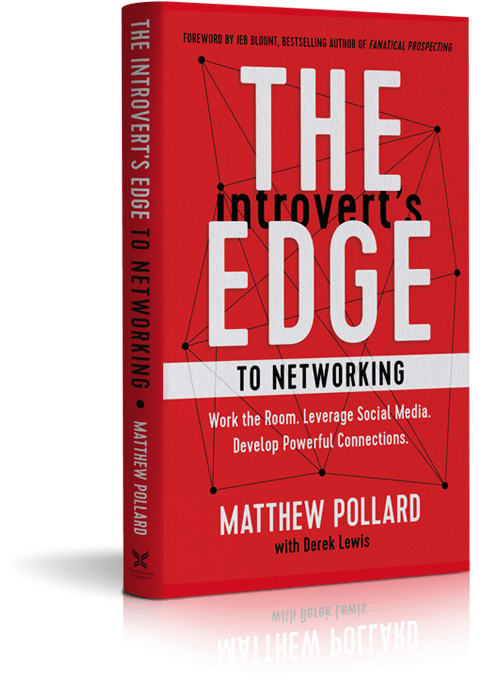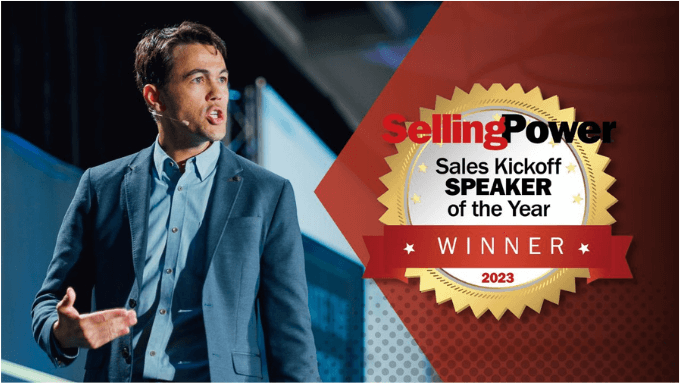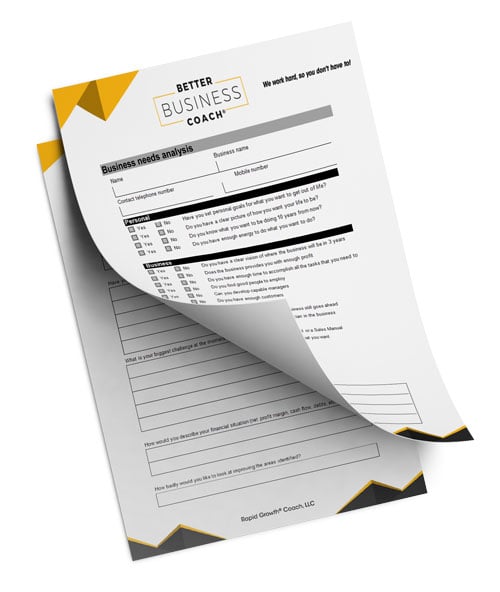Better Business Coach Transcript
This is Better Business Coach session number four.
Welcome to Better Business Coach. My name is Matthew Pollard, and as always, I will be your rapid growth guy. Now, if you haven’t already – and I know I mentioned this in all my other sessions – please subscribe to both the video and audio podcasts on iTunes or any other form of media so that you don’t miss a thing.
Why it is Crucial to Know These Things about Business Owners
This session is specifically designed to help you understand the major coaching surprises you will have during your first few months of coaching. See, until I started coaching for my first few months, I didn’t understand just how deep the rabbit hole went. I always thought that business owners and staff longed for the same thing – the most successful, profitable, and productive business possible – so they could all grow within the organization to success.
It turns out that some business owners actually prefer to work just enough so that they can go on holidays; some want a business that works while they travel. Other business owners want to be able to get out of work as quickly as possible so they can spend more time with their family. Some business owners don’t want any stress at all, so they want to ensure that they grow at a consistent and comfortable pace so that they get a similar number of customers, never more, so that they can maintain their current business operations.
On the other hand, some staff members like a place where they can grow and get promotions and pay raises and enjoy the success that the business obtains; they take pride in that success. Other people just want to enjoy their 9 to 5 job and go home and not have anything to worry about. They just want to complete a task and then leave.
So as a coach, you can’t bring any of your preconceived ideas about what a person should or shouldn’t think about any specific business or any specific new thing you’re going to implement. You have to analyse each person as an individual and determine what your coaching is going to be able to provide them and what obstacles you may face. With business owners and staff, we’ve got some wonderful templates that we will release in the future sessions that will help you to understand that.
Next, it’s important to understand that people adapt and perceive things differently. See, in neurolinguistic programming – and a lot of people may have had this training, and if so, I apologise. I’m going to go over some absolute basics. In the study of neurolinguistic programming, we learn that people are presented with 2 million bits of information every single second, and we can only process – depending on the study you read, some people say 236, other people say just over 300 – but really not that many. This is the best way it’s been explained to me: imagine getting 2 million match sticks placed in your hand every second, and having to just pick the couple hundred that you want to actually hold onto.
It’s almost impossible, but our brain, which is a major supercomputer, does it by deleting, distorting, and generalising all of the information through our beliefs, our values, and our past experiences; the end result is what we perceive.
The first thing I want you to understand is that when you implement something into a business, a person may not react as you expect them to, because based on their values, and beliefs, and past experiences, they may perceive it in a completely different way than you.
Here is a good example: when you want to implement a new system, a person that works for that organisation may have seen that happening in one of their previous organisations, and as a result, they might have gotten retrenched. Therefore, you want make sure that everybody is on the same page before you take action.
Understanding Business Owners and Their Staff is Key
Also, people adapt to things differently, so it may be that a person isn’t upset about the new system that’s getting implemented, they may just take longer to learn it. So you want to make sure you don’t have a preconceived idea about how long it will take to integrate the system. Every single person does things differently and perceives things differently, and you need to allow for that.
Next, we need to understand that many business owners are lonely at the top. I know for myself, I got promoted ridiculously early, within the first 12 months of working for an organisation. I ended up the state manager of the head office of the largest telecommunications sales company in the country, and all of a sudden, I only had a few colleagues I could talk to. Very shortly after that, I opened up my own business, my first business, and I had one business partner, and that was the only person I could communicate with.
It was lonely, and I was lucky to even have a business partner. What you will learn is that many of these people you speak to will be by themselves. They will be lonely, and sometimes, as a coach, just acting interested in what they do and listening to them unload their stresses and their worries is such a major thing; a lot of people will pay you just to talk.
Sometimes you will feel that their talking is stopping you from providing the service that you know you can provide, and that’s fine. Sometimes we need to put barriers or curb the conversation to help them get those “Aha!” moments. However, sometimes we need to allow them the opportunity to talk, because sometimes that’s all they need.
You’ll also find that sometimes you may be the first person that is actually interested in their stories and what they’re doing, and possibly the first person that is actually proud of them and says that they’ve done a good job. See, a lot of people that are business owners have their significant others, family members, and friends telling them how risky it is to be in a small business. You may be the first person to tell them that what they’re doing is correct, and that can be special enough for people to want to continue coaching with you.
Next, people display a lot of behaviours that keep them from achieving success. One example is that people will sometimes think they already know everything and there’s nothing that anyone else can do to help. I often say to people that no one is ever too old to learn how to do something better. It’s something that nobody can disagree with. However, you’ve got to unfreeze somebody, and if you don’t know the Lewin’s model of change, I suggest that you have a look at that.
It’s necessary to unfreeze a customer before you can change anything. Then you can refreeze them into new habits. But if they think they know everything, they’re not going to take anything that you say to heart, so it’s important that you unfreeze them first.
Additionally, they’re always worried that people are ripping them off; this can limit their achievements because none of the managers feel like they are given the empowerment to make decisions. They’re always worried that their boss is looking over their shoulder, and we need to work on helping them get away from that.
Lastly, business owners quite frequently think that only they can do it, and this is a limiting behaviour that keeps them from achieving. Until I started coaching, I never believed that business owners could get in their own way so much, and I think that you will find the first few months of coaching absolutely eye opening in that regard.
Business owners tend to be very, very time poor. However, a lot of that time is wasted. The eighty/twenty rule is a big thing that I like to stress with clients; it means that generally, most business owners spend about 80% of their time being unproductive and 20% of their time actually being productive. This rule also applies to their customers. Generally, they get 80% of their revenue or profit from 20% of their customers, and from the other 80% their customers, they only receive 20% of their profit. This could be considered time wasting, and sometimes they’re even losing money from those people as a result of the amount of time it takes to look after those clients.
I’ve actually got book coming out in a few months that discusses time management and the strategies to use in order to improve at it, and I’ll share that with you at the appropriate time as it gets released.
The last one is that a lot of people will resist change because they’re scared of new systems, usually because they are worried that they may not understand it. They’re scared that they may not be good enough to understand the new system and that they could potentially look bad. So what we need to be aware of is that sometimes when you think you’re introducing something that could really, really help the business, and you are met with rejection, even from the business owner, it could just be that they’re scared of change. They like things the way they are.
Finally, many business owners work in their business, not on their business. See, before I owned my own business and before I started coaching, I always believed that most business owners had a grand plan of where they were going, and they managed their staff to help them get to that goal. They worked in their business sometimes. However, they always kept a mindful eye on where they were going, their strategy, and what they were doing.
What I’ve learned since business coaching is that most business owners tend to leave a functional skill or profession that they did in their previous employment and open a business that allows them to provide that same service where they have to do all the other skills as well, which means that they have to work a lot harder. Then they get in their own way by not engaging staff or trusting staff to do things and saying that only they can do it. As a result, all they do is end up working in their own business.
Robert Kia Saki wrote Cash Flow Quadrant, which is a great book to read if you haven’t already. In it, he continually talks about people that have a functional skill that work in their business, not on their business, as being an S, not a B. They’re self-employed, and basically, they own a job as opposed to a business, because a business truly makes the money even when you’re not there. And if you’ve not read E-Myth this will give you some other great stories about people that are stuck in their business.
So again, this is only a very general thing to be ready for. We’ll give you templates and things in order to help you break down these barriers with people, but I just didn’t want you to go into your first coaching session and be surprised that they’re getting in their own way so much.
So that 7, again, was business owners and their staff wanting different things, people adapting to and perceiving things differently, business owners being lonely at the top and sometimes just wanting to share stories and vent and have somebody that tells them that they’re doing a good job, people that display behaviours that limit themselves such as “I know everything,” “My staff are trying to rip me off,” and “Only I can do it,” business owners being time poor, even though that time may not be productive time, people resisting change in the business because they’re worried about it making them look bad or because they’re having a difficult time adapting to it, and finally, many business owners that are actually just looking for a job or currently just have a job. They’re working in their business, not on their business.
So when you go out and coach, don’t be surprised by any of this. These are all things that I learned within my first period of time as a business coach, and I hope by giving you these things up front, you’ll expect them and be prepared for them. Once I provide you the templates, the ideology, and the training that you will need, you will be able to help your clients overcome them.
Again, thank you very much for your time today, and if you haven’t already, please provide a review on iTunes stating what you think about this podcast and the star rating that you think this podcast is worthy of. I really appreciate any comments that you have, either positive or negative. I just want to see how you guys think I’m doing, and I want to hear about any success stories that you’ve got.
You’ll also be able to find the session notes and all the downloadable worksheets for the sessions to come on MatthewPollard.com or BetterBusinessCoachPodcast.com. Thanks again for your time, and I look forward to seeing you in the next session. Cheers.

























